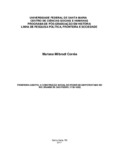| dc.creator | Corrêa, Mariana Milbradt | |
| dc.date.accessioned | 2018-04-19T13:49:37Z | |
| dc.date.available | 2018-04-19T13:49:37Z | |
| dc.date.issued | 2017-08-15 | |
| dc.identifier.uri | http://repositorio.ufsm.br/handle/1/13012 | |
| dc.description.abstract | The following work was developed in the concentration area of “History, Culture and Power” in the research line “Integration, Politics and Frontier” of the masters course of the Post Graduated Program in History from the Federal University of Santa Maria (UFSM), with support from CAPES scholarship. The goal is to enquire about forms of power’s social construction and apropriation of resources from the elites in an open frontier region in the end of the XVIII century and in the begin of XIX centuty. The study was elaborated from the trajectory analysis of a potentate located in Rio Grande de São Pedro, José de Abreu - Barão do Serro Largo. In this sense, we had thought about his role as a mediator, that adjusted to the local reality, was able to establish relations with the large and multi-ethnic population that inhabited the frontier, being one of the links connecting the region to the Portuguese administrative network. It was possible to perceive, therefore, that Abreu's social ascencion had been allowed by the opening of the frontier after the conquest of the Missions in 1801. The conquered territory opened spaces for the insertion of new elites, who took field’s possession and organized spaces of command in new frontier. Abreu constructed his military store from a series of factors, among which stood out the alliance with the indigenous local population (guaranis from the Missions and groups of charruas). Besides to the relationship with the groups of military and militiamen officers who went to that region, receiving land that was distributed by José de Abreu, in exchange, mainly, by the military services. It was also possible to verify, in the same way, that these groups were very integrated. Abreu also managed to establish close ties to the Court, which made possible his appointment to the position of Governor of Arms, and his projection to a command space within the province. | eng |
| dc.language | por | por |
| dc.publisher | Universidade Federal de Santa Maria | por |
| dc.rights | Attribution-NonCommercial-NoDerivatives 4.0 International | * |
| dc.rights.uri | http://creativecommons.org/licenses/by-nc-nd/4.0/ | * |
| dc.subject | Barão do Serro Largo | por |
| dc.subject | Mediadores | por |
| dc.subject | Relações de reciprocidade | por |
| dc.subject | Recirprocity relations | eng |
| dc.subject | Brokers | eng |
| dc.title | Fronteira aberta: a construção social do poder de um potentado no Rio Grande de São Pedro (1750-1830) | por |
| dc.title.alternative | Open frontier: the power’s social construction of a potentate in the Rio Grande de São Pedro (1750-1830) | eng |
| dc.type | Dissertação | por |
| dc.description.resumo | O presente trabalho foi desenvolvido na área de concentração “História, Cultura e Poder” na linha de pesquisa “Fronteira, Política e Sociedade” do curso de mestrado do Programa de Pós graduação em História da Universidade Federal de Santa Maria (UFSM), com auxílio da bolsa CAPES. O objetivo é investigar as formas de construção social do poder e de apropriação de recursos das elites em uma região de fronteira aberta entre fins do século XVIII e início do século XIX. O estudo foi construído a partir da análise da trajetória de um potentado do Rio Grande de São Pedro, José de Abreu- o Barão do Serro Largo. Nesse sentido, pensou-se seu papel como um mediador que, ajustado à realidade local, pôde estabelecer relações com a ampla e multiétnica população que habitava a fronteira, sendo um dos elos a ligar a região à malha administrativa portuguesa. Foi possível perceber, assim, que a ascenção social de Abreu fora permitida pela abertura da fronteira a partir da conquista das Missões em 1801. O território conquistado abria espaços para a inserção de novas elites, que se apropriavam de campos e organizavam espaços de mando na nova fronteira. Abreu contruíu seu cabedal militar a partir de uma série de fatores, dentre os quais se destacavam a aliança com a população local indígena (guaranis egressos das Missões e os grupos de charruas). Além do relacionamento junto aos grupos de oficiais militares e milicianos que se deslocavam para essa região, recebendo terras que eram distribuídas por José de Abreu, em troca, principalmente, dos serviços militares. Foi possível constatar, da mesma forma, que esses grupos estavam muito integrados. Abreu ainda conseguiu estabelecer vínculos próximos à Corte, que tornaram possíveis sua nomeação para o cargo de Governador das Armas, e sua projeção a um espaço de comando no âmbito da província. | por |
| dc.contributor.advisor1 | Farinatti, Luís Augusto Ebling | |
| dc.contributor.advisor1Lattes | http://lattes.cnpq.br/1043707938149901 | por |
| dc.contributor.referee1 | Momissoli, Adriano | |
| dc.contributor.referee1Lattes | http://lattes.cnpq.br/7502584317371586 | por |
| dc.contributor.referee2 | Osório, Helen | |
| dc.contributor.referee2Lattes | http://lattes.cnpq.br/5350547241540713 | por |
| dc.creator.Lattes | http://lattes.cnpq.br/6431742477122110 | por |
| dc.publisher.country | Brasil | por |
| dc.publisher.department | História | por |
| dc.publisher.initials | UFSM | por |
| dc.publisher.program | Programa de Pós-Graduação em História | por |
| dc.subject.cnpq | CNPQ::CIENCIAS HUMANAS::HISTORIA | por |
| dc.publisher.unidade | Centro de Ciências Sociais e Humanas | por |



